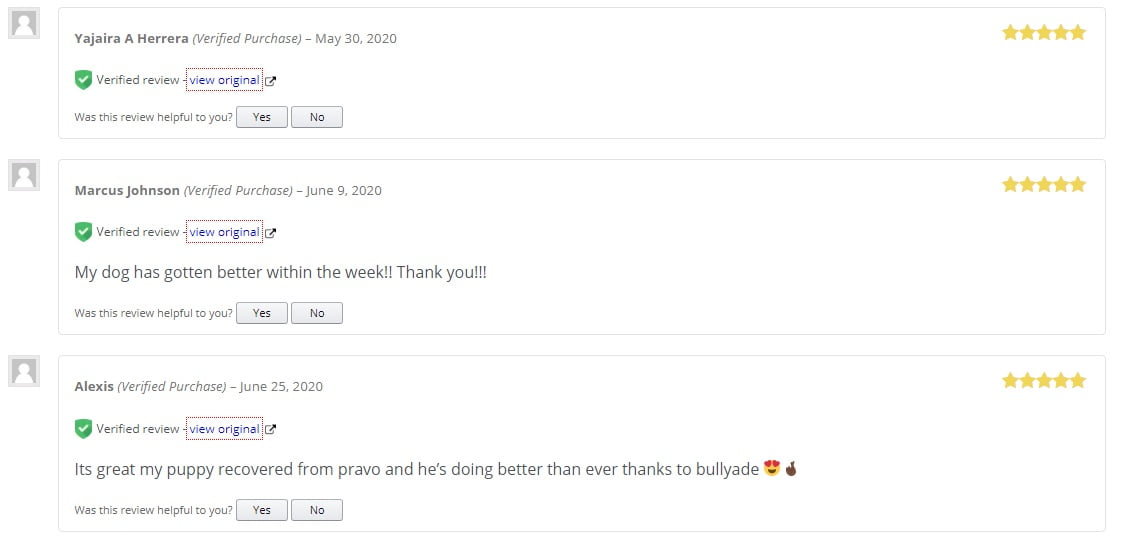Can parvo go away naturally

How Long Does Parvo Last? Parvo Treatment Tips
How Long Does Parvo Last? Parvo Treatment Tips
Did you know that 85% of puppies die because of parvo and not getting the right parvo treatment?
Thats a scary number. What is even scarier is that most dog owners are not aware their dogs have parvo.
But, is it easy to detect parvovirus in your puppy? Turns out this virus slips into your dog unnoticed and triggers severe infections.
Which is why you should always watch out for the early signs of parvo in dogs.
When the virus gets into your dog, it takes 5 to 10 days to incubate.
By the 11th day, you will begin noticing symptoms in your dog that are triggered by the virus.
Note that these symptoms can be different in dogs.
Yet, there are those common symptoms of parvo you should look out for.
Real Bullyade Customer Reviews

What is the First Symptom of Parvo?
How do I know my dog has parvo?
The first common sign of parvo in dogs is extreme lethargy.
Your dog will sleep a lot during the day and show less activity.
As the infection progresses, the poor pup will develop a severe fever.
Vomiting anddiarrheaare other serious symptoms of parvo with dogs. In fact, it is the biggest tell-tale sign that Bingo could be suffering from Parvo.
Other symptoms may clear away, but vomiting and diarrhea do not stop.
And you know what that does to your dog?
It getsseverely dehydratedas it loses more body fluids. At this point, your dog is in real danger.
It can lose its life if treatment is not started immediately.
Which brings us to our next question;
Parvo Treatment 101: How is Parvo in dogs treated?
- If you suspect your dog has parvo, take him to a vet for a diagnosis.
If the results come out positive of parvo virus, your vet will suggest a plan.
- The good news is, there is a 90% chance your dog will survive the virus when a trained vet attends to him.
Then there is the buzzkill. Treating parvo in dogs can be costly.
- It can cost at least $500 to make the bad symptoms of parvo go away.
- Some dog owners have coughed up to $2000 for recurring treatments.
Not everyone has that kind of money. Does it mean your pooch is going to die if you do not do this?
- The answer is no, he will not die. There is an alternative way of treating parvo that does not require you to incur a lot of costs.
The best part, you get to do it at home while comforting your furry friend with a natural pillow.
It is possible to treat parvo at home if you have the right tips with you.
More good news, it will only take a week for you to start seeing improvements in your dog.
You only need to cover the cost of vet consultation to be sure that it is parvo we are treating in your dog.
How can you treat parvo at home?
Treating parvo at homeis a step-by-step process. Here is what you need to combat the virus;
- Saline solution (Distilled Water works if you cant get a hold of saline)
- Minimum 6 cc syringe (Bigger the syringe the better)
- 22 gauge needle
- Amoxicillin for dogs
- Tamiflu
- Pepto
- Gerber Chicken Flavored or Beef Flavored baby food
- Thermometer
- Bullyade (Flavored vitamins and mineral for dogs)
- You can use distilled water in place of saline solution.
A 6cc syringe is perfect for a puppy that weighs about 2 pounds.
You may need a larger dosage for a bigger dog.
A 22 gauge needle is tiny enough to inject the saline water into your puppy.
Any need larger than that can cause an injury on your puppy.
Day 1 Parvo Treatment
- You need to inject the saline solution (or distilled water) into the puppys skin.
Use your two fingers to pinch the skin at the back of the puppys neck. This may be a bit hard if your puppy has lost a lot of water. But do your best in getting a fold of skin between your fingers.
- Now fill the syringe with saline water and inject it into the fold of skin between your fingers.
Your puppy may yelp in pain. You have to ensure he is held down to prevent any sudden movements.
- Inject the fluid slowly into the puppys skin until you feel a bump forming. The puppy will absorb all the fluids into its system. This will be repeated one-hour after the bump goes down.
- Now we introduce Tamiflu to combat those flu-like symptoms caused by parvo.
Tamiflu is not recommended after day 1. Flu symptoms tend to stick around for a while. We recommend getting several bottles of Tamiflu for rainy days.
- Monitor your puppies temperature. Puppies normal temperature is 101.5 degrees.
If their temperature is high, cool them off with a wet rag.
- Apply the wet rag to their paws, butt, belly, and neck.
If their temperature is low, warm them up immediately.
Puppy fevers cause organ damage, and should not be taken lightly.
- Tamiflu Dosage for puppies; Tamiflu comes in capsules of 75mg each.
- Order Bullyade today, as you will need it in a few days.
Day 2 Parvo Treatment
Now besides giving your dog IV fluids, you also have to kill the opportunistic infection ailing your puppy.
- This is where Amoxicillin for dogs comes in.
It kills the bacterial infection in your puppys gut. With the infection gone, your puppy will regain its appetite.
- Your puppy may have bloody diarrhea, a teaspoon of Pepto will help coat their stomach providing relief.
- If they seem weak, begin force-feeding a small amount of Gerber chicken or beef flavored baby food.
Gerber baby food is easy on their digestive system.
- Dosage: The recommended dosage for Amoxicillin for puppies is 10mg per kg of body weight.
- Give your puppy the dosage after every 12 hours.
This prevents the bacteria from developing resistance to the drug and kills it completely.
- Gerber chicken or beef flavored baby food should be given in small amounts.
- 1 to 2ccs of baby food at a time. Feeding small amounts at a time will help prevent vomiting.
Day 3 Parvo Treatment
- Continue hydrating your puppy with saline or distilled water every 4 hours. This is usually the worst day.
- Continue to monitor your puppys temperature. Continue to feed your puppy 1 to 2ccs of Gerber flavored baby food every so often. This will help withvitamin deficiency.
Day 4 Parvo Treatment
- By this day, you should already notice major improvements in your puppy.
- Your dog should start showing activities like eating and drinking from his bowl.
- Take note he is still quite weak and needs more days off.
- Continue administering the fluid and antibiotics.
- During the vomiting and diarrhea bout, your dog lost a lot of nutrients in his body.
So we are going to introducevitamins and mineralsinto his body on day 5.
Day 5 Parvo Treatment
This is the day people are praying they can reach.
- If your puppy has been showing symptoms for 5 days and they are not getting any better, there is a good chance they are also infected with Coccidia.
Nevertheless, if they are doing better we recommend getting Bullyade for puppies which are filled with over18 vitamins and minerals.
Now your puppy may have regained its strength, but he is not out of the woods. Parvo takes a toll on your puppies vital organs.
- Give your puppy the next ten days to recover completely.
A great diet, with puppy designed vitamins and minerals, will ensure your puppy is back to full health quickly.
- Bullyade rehydrates your puppy while providing vital nutrients into his body.
This supplement for puppies also replenisheselectrolytesthat were lost during vomiting and diarrhea. Bullyade helps your puppies organs return to normal function.
It has a chicken or beef flavor that your puppy will like.
He may not be ready to drink his water yet, but with a single scoop of Bullyade, the water tastes just like its favorite broth.
Day 6-Day 7 Parvo Treatment
- We recommend you spend more time with your dog as he recuperates.
- If he is strong enough, take him out for brief walks.
- Schedule for checks up with your vet to check if the infections are gone and the virus subdued.
- Monitor their temperature, and dont allow them to overwork themselves for the next 7 days.
Final Thoughts on Parvo Virus
- It only takes 7 days to cure parvo in puppies.
You do not have to go for expensive medical treatment for parvo.
You only need to rehydrate your dog, kill the bacterial and viral infections inhim,and replenish the nutrients and electrolytes he lost.
Bullyade will help with faster recovery.
THE BULLYADE CHRISTMAS SPECIAL SALE IS HERE
- Sale!

$84.98$42.99Pets Christmas Sale- Puppy Starter Pack + Raw Diet Recipe Book
- Sale!

$79.98$34.99Christmas Special Sale Pet Products Vitamin Pack for dogs + Raw Diet Recipe Book
- Sale!

$234.93$124.99Christmas Special Sale Pet Products- Super Puppy Combo Pack + Raw Diet Recipe Book
Everything You Need to Know About Parvovirus B19
Parvovirus B19 is a common virus that spreads from person to person. Its mostly passed through respiratory secretions, like saliva, mucus, or sputum. These can spread when people cough or sneeze.
You may have heard of parvovirus in cats and dogs. But B19 is different it only affects humans. You cant catch parvovirus B19 from pets, nor can you give it to them.
Most of the time, parvovirus B19 doesnt cause serious problems. According to the Centers for Disease Control and Prevention (CDC), about
If you do experience symptoms, theyre likely to be mild. But some people may be at high risk for developing more serious problems if they catch this virus. Groups at higher risk include those who have weakened immune systems, are pregnant, or have certain types of anemia.
Parvovirus B19 can cause fifth disease, a classic viral illness, often with flu-like symptoms and then a rash. Some refer to it as slapped cheek syndrome because reddening of the cheeks is a classic symptom. Fifth disease can affect anyone, but it more often affects children.
Parvovirus B19 usually goes away on its own and often doesnt require any specific treatment.
Read on to learn more about parvovirus B19 in humans, whos at risk, and how to manage the virus.
Possible symptoms of parvovirus B19 in humans include:
- a raised rash on the torso, arms, or legs
- a pink or red rash on the cheeks and chin
- painful or swollen joints (more common in adults)
- fatigue
- low grade fever
- headache
- stomachache
The rash develops fairly late and usually goes away after about
In very rare cases, parvovirus B19 can cause your body to stop making new blood cells. This is called a transient aplastic crisis. You may be
- sickle cell anemia, an inherited disease that causes abnormally shaped red blood cells
- other types of anemia
- a weakened immune system from conditions like cancer and HIV, or an organ transplant
Parvovirus B19 is an infectious virus that spreads from person to person. It spreads through nasal secretions, saliva, or spit when a person sneezes or coughs.
It can also spread via:
- affected blood or blood products by plasma
- bone marrow or organ transplant
- a pregnant person to their baby
Anyone can develop human parvovirus, but school-aged children are more likely to develop fifth disease. About
You may be prone to experiencing symptoms or complications of the virus if you have:
- sickle cell anemia
- other types of chronic anemia
- a weakened immune system
Studies show that people with sickle cell anemia are more likely to become seriously ill if they get parvovirus B19. Sickle cell anemia is more common among:
- Black people
- people of Middle Eastern, Asian, Indian, and Mediterranean descent
- Hispanic Americans from Central and South America
In the United States, parvovirus B19 infections are
According to 2017 research, about
Typically, doctors diagnose human parvovirus by performing a physical exam and asking about your symptoms.
Sometimes, they may order a blood test if youre at high risk for complications. The blood test checks for antibodies your body produces to fight the infection.
A polymerase chain reaction (PCR) test can also confirm parvovirus B19.
Pregnancy screening
If youre pregnant and your doctor suspects you have parvovirus B19, you may undergo further testing.
A doctor may order an antibody or PCR test on amniotic fluid or blood drawn from the umbilical cord. You might also need to undergo more frequent ultrasounds to monitor the fetus.
Pregnant people exposed to parvovirus B19 should let their doctor know right away.
For most people, human parvovirus will go away on its own without any need for treatment. However, medications such as acetaminophen (Tylenol) and ibuprofen (Advil) can help relieve discomfort.
Its also important to get plenty of rest and drink enough fluids if you have the virus.
People or fetuses who develop severe anemia may need a blood transfusion.
Patients with weakened immune systems may receive special antibodies to treat the infection.
Some people who contract parvovirus B19 wont develop symptoms. Others experience mild symptoms that dont interfere with their daily lives for long.
People who are pregnant, have compromised immune systems, or have a form of anemia, may need to take special precautions if they develop parvovirus.
Most people clear the infection without issue and cant get it again. But people with weakened immune systems may develop chronic or reactivated parvovirus if they arent able to clear the virus fully.
Fetal outlook
In the rare case that a fetus contracts a parvovirus B19 infection from a birthing parent, the outlook depends on when the infection occurred.
According to
Theres no vaccine or treatment to prevent parvovirus B19. Still, you can reduce your risk of catching or passing the virus if you:
- Wash your hands frequently with soap and water.
- Cover your mouth when you sneeze or cough.
- Avoid touching your eyes, nose, or mouth.
- Keep away from people who are sick.
- Stay home when youre sick.
Can I get parvovirus from my pet?
No, you cant catch parvovirus B19 from your pet, and your pet cant get it from you. The type of parvovirus that pets contract is different.
What is the incubation period for parvovirus?
It takes parvovirus B19 between 4 and 14 days to cause symptoms.
Can I spread parvovirus if I dont have any symptoms?
Yes, you can pass the virus to others if you dont have symptoms. Some people with parvovirus B19 dont develop any symptoms, but the infection is still contagious.
Is there a parvovirus vaccine?
Theres no vaccine to prevent parvovirus B19. Researchers developed a
Parvovirus B19 usually causes a harmless infection. But if you have a condition that affects your immune system, have sickle cell anemia, or are pregnant, you should see your doctor if you think you have the virus.
Like most contagious illnesses, the best way to stop the spread is to adopt healthy habits, such as frequent handwashing and physical distancing.









